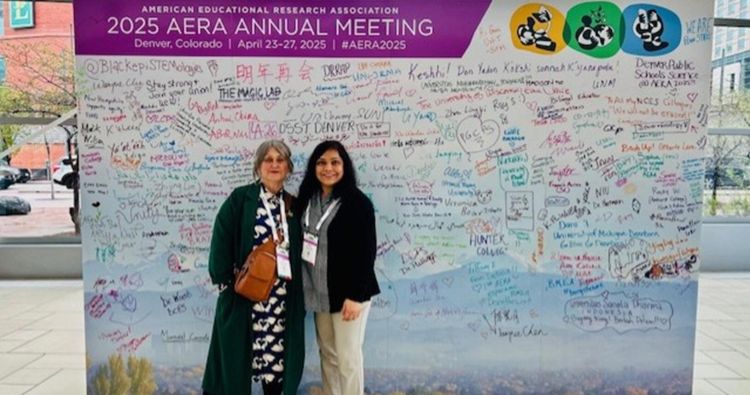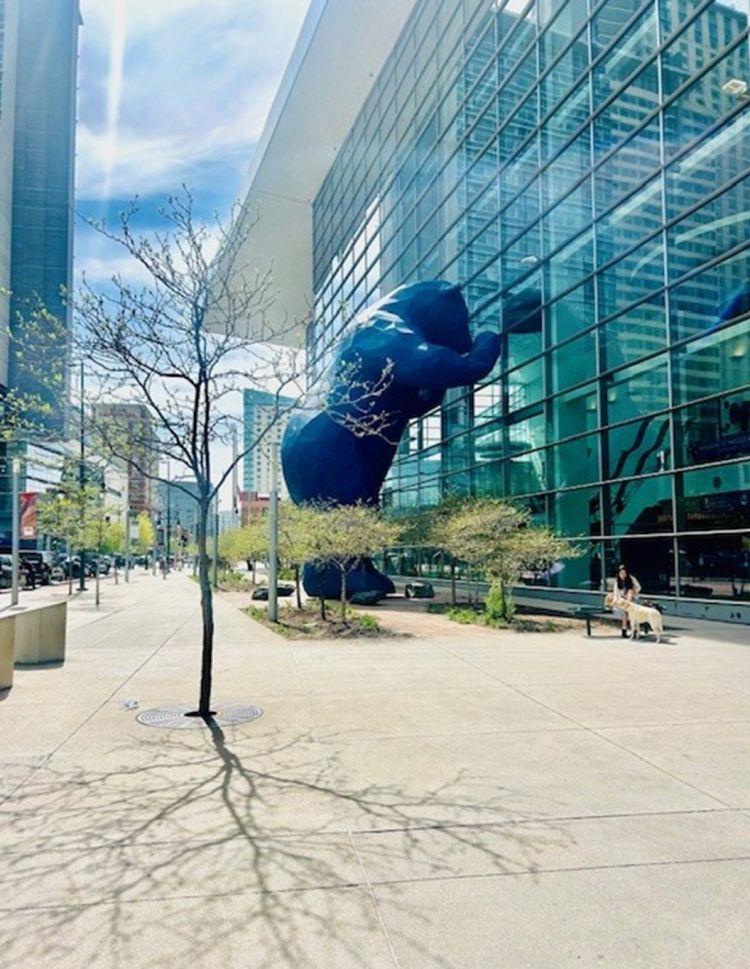PGR Student Presents Research at Leading U.S. Conference

Funded by the White Rose Doctoral Training Partnership, a School of Sociology and Social Policy Postgraduate Research Student attended the American Education Research Association Conference.
Gill Porter, Postgraduate Research Student in the Centre for Disability Studies (CDS), School of Sociology and Social Policy (SSP), recently attended the annual American Education Research Association (AERA 2025) conference in Denver, Colorado. Gill has captured her trip in this engaging reflection piece.
A reflection from the American Education Research Association Conference
“In my first year of PhD, via the ESRC 1+3 White Rose Doctoral Training Partnership (WRDTP), I am incredibly grateful to have been funded by them, and supported by my supervisors in the CDS and SSP, in such a prodigious opportunity. Arriving in Denver late on the evening of Tuesday 22 April, I attended sessions through Wednesday 23 April to Saturday 26 April, flying back to the UK on Sun 27–Mon 28 April.
The AERA conference is extensive in scale, with well over 10,000 educators attending, despite the current situation in the USA and amidst many contributors having to make the difficult – or enforced – decision to either not attend or attend virtually. The theme for the conference was ‘remedy and repair’, and I was immensely pleased to have had my abstract accepted so that I could present my research at a round table event with other research-in-progress graduate students and like-minded peers (details below). The research-in-progress round tables were a new introduction this year and were well attended. Additionally, our panel were pleased to have a full table of attendees and, as we delivered on the first day of the conference, it provided the chance to meet people straight away.
The conference also presented the opportunity to network across research, education, and disability disciplines and to be surrounded and encouraged by committed Disability Studies (in Education) folks, graduate students, educators, researchers, activists, and allies, in sharing conversations, support, and coffee. Having my paper accepted, being able to attend such a wide variety of sessions across my own and other specialisms, attending sessions with leading Disability in Education (DSE) scholars such as Dr Subini Annamma, Professor David Connor, Professor Beth Ferri and Dr Emily Nussbaum, and meeting with peers and other scholars in my field of DSE was a milestone event for me in progressing my research and academic presence.
There were over 2,000 sessions to choose from, with each session including multiple papers, so the conference app was an important tool for selecting and storing sessions of interest. All of the sessions (symposiums, papers, and round tables) involved delivery from multiple speakers and included a discussant. As a member of the DSE Special Interest Group (SIG), the majority of sessions I attended were from that field. However, I also attended other SIG events including, for example, ones focussed on creative research methodologies, especially as my focus post-conference is to start preparation for Transfer.

The Colorado Convention Centre
Here, I want to comment on two of the sessions I attended, and reflect on a particular aspect of attending the conference.
1. Reimagining disability research: the power of accessible, critical and creative methodologies
This was a DSE SIG event, and papers presented drew from theories and ontological and methodological approaches, including such as DisCrit (Disability Studies and Critical Race Theory), cripistemologies, participatory and ethical research, narrative methods, and DSE, drawing from the work of such scholars as Dr Subini Annamma. Across the session, discussions advanced across: creative methodological approaches, incorporating photovoice, journey mapping and online noticeboards; pushback on extractive and hegemonic ways of designing and conducting research; intersectionality; and ideas for progressing more democratic, affirming knowledge production. It was lively and engaging and, in an inaccessible space (acknowledged by the panel), it had accessibility designed in to incorporate stim toys, scratch cards, American Sign Language (ASL) interpreters and automatic audio transcription displayed on screens across the tables. This latter provision was available at all DSE SIG sessions, and the session’s accessibility-by-design was also an opportunity to model inclusive and accessible practice to the wider educational conference.
2. Reflections on positionality: a call towards reimagining roles, responsibilities, and relationships in research (paper session)
This session was fierce, rich, lively, thought provoking, and community-building. Talking from the projects they had worked on, Dr Mildred Boveda and Dr Subini Annamma asserted that although remedy is never enough, to continue to ask what remedy and repair might look like in both big and small ways to ensure we are not continuing injustice in our research; and, that our positioning is dynamic, changing across contexts. Questioning universities’ imbrication in colonial dispossession, Dr Chris Jadallah asked: how then can we enact remedy and repair? Embedded in place, land, and heirloom cuisine of Palestine, he offered the provocation that relationality is not a new metaphor to be reaped for academic research. Dr Kaleb Germinaro had students in the audience, and his rapport with them was uplifting. Demonstrating the embodied knowledge that we carry within ourselves and, as a self-described passionate ‘dog dad’, he began his session with photographs numbered 1-6 of his dog displaying various canine emotions, to ask: what dog are you today? Interested in embodied ethnography as method, and how this moves through space and time, it also reminded me of bell hooks on belongingness and temporal relationship(s) with place(s).
3. A reflection
Having previously delivered a presentation on my Disability Studies MA dissertation at the international conference Challenges, innovations and opportunities in inclusive Higher Education practices, at the University of Leeds, in June 2023, I was again reminded at AERA, an international education conference, of the very real merit in presenting DSE work in a multi-disciplinary arena: getting disability (studies) out there.
Final thoughts
A contemplation on America. Veteran and regular attenders of the conference I spoke to felt that the mood of the conference was much more subdued than usual, and I would like to take a moment to comment on the generosity of the educators I met in sharing their stories and concerns amidst the sweeping and destabilising changes being wrought on education by the new US administration. Across conversations, with educators from different stages of education (school, community, higher), stories were shared of cancelled funding and opportunities, publications being removed, teachers being surveilled and intimidated in their classrooms, of worries for future projects with both national and international scholars and educators and worries for a decline in international university students and scholars’ presence on the international stage. Fundamentally, there were very real concerns for the communities they work with, the impact to the lives of young people, and the future of American education and educational research. In one panel session I attended, a panellist broke into tears, advising that they received an email on Friday evening revoking their project funding. Perhaps unsurprisingly then, a protest had been organised at the capitol building, details of which are available here. Amongst all this, it felt a really important time to be in the USA, and I look forward to maintaining the new connections I made and, hence, and for multiple reasons, the conference was more than I expected. Next: sitting with processing the whole experience and the knowledge exchanged, and taking my own research forward.”
– Gill Porter, PGR, Centre for Disability Studies, School of Sociology and Social Policy
The School of Sociology and Social Policy would like to congratulate Gill on this achievement, and looks forward to the continued impact of her Postgraduate Research.
Connect with SSP on LinkedIn and BlueSky to keep up-to-date with latest news from the School.




